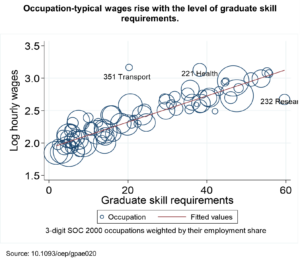Graduates typically earn more than non-graduates, a phenomenon known as the graduate wage premium. Despite its significance, the factors driving this premium have rarely been thoroughly analysed. This gap limits our understanding of the demand for graduate skills, the effective utilization of these skills, and the development of policies to boost high-skilled labor demand in the economy. Our research tackles this gap by studying the tasks people do at work and linking these tasks to the qualifications needed for their job and their pay. We find that the demand for graduate skills has matched the rising graduate supply spurred by the education expansion since the 1990s. Notably, our analysis across British regions from 1997 to 2017 suggests that this expansion, rather than exogenous factors, has so far driven the demand for graduate skills, thereby balancing the development of supply and demand in Britain. The findings underscore the pivotal role of education in shaping and transforming the graduate labour market and the economy as a whole.
Key Findings
- Connection Between Job Tasks, Qualifications Requirements and Wages: Our study confirms the tasks workers perform are directly linked with the qualifications required for jobs and the wages jobs pay, grounding skills requirements in jobs’ task profile and linking them to individual productivity.
- Graduates Maintained their Position: Graduates have maintained their rank within the job skills hierarchy, demonstrating the demand for graduate labour has held its ground.
- Price for Graduate Skills Requirements: Employers pay a substantial and stable premium for tasks that require graduate-level skills, highlighting the continued economic value of higher education.
- Contribution to the Graduate Wage Premium: Approximately 40% of the graduate wage premium can be attributed to the differences in tasks performed by graduates compared to non-graduates, emphasizing the significant contributions of work content for pay.
- Impact of Education Expansion: The mass expansion of education has significantly enhanced regional requirements for graduate skills and consequently increased wages, affirming the critical role of educational growth in regional economic development.
- Recent Trends in Skills Requirements: Despite these positive trends, the growth in graduate skills requirements has shown signs of slowing since 2006, suggesting new challenges and shifts in the demand for high-skilled labor.
Main Message
A high and stable price for tasks requiring graduate skills, coupled with consistent matching of graduates to these tasks, underscores the ongoing economic importance and demand for higher education in the British economy. The demand for graduate skills has risen in response to the increased supply following the educational expansion since the 1990s. However, the growth in skills demand has slowed since 2006, signaling a more uncertain future. As we navigate macro-level disruptions, understanding these dynamics becomes crucial for ensuring the continued effective utilization of graduates.

Implications for policies and practices
The primary implication of our study for policy is to recognize the significant impact of higher education expansion on the British economy and the stable, high value that employers place on tasks typically requiring graduate-level skills. This highlights a need for long-term, persistent economic growth strategies for high-skilled sectors.
For universities, our findings indicate that, on average, their provision has been on the right track. However, it remains crucial to continually support curricula and programmes that equip students from diverse backgrounds with the knowledge and complex skills needed to contribute to society and succeed in high-skilled jobs.
As the expansion of graduate skills requirements has slowed recently, indicating a potential decoupling between the growth in graduate numbers and their utilization in the economy, a combined policy strategy that considers both skills supply and demand has become even more pressing.
Finally, there is a need for ongoing debate on how to strengthen non-graduate routes into high-skilled jobs, thereby opening up well-paying jobs and facilitating social mobility. The significant economic impact of the higher education expansion underscores the potential of a strong educational strategy to shape individual life chances, the economy and society at large.

